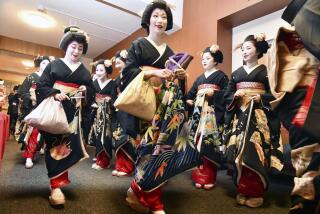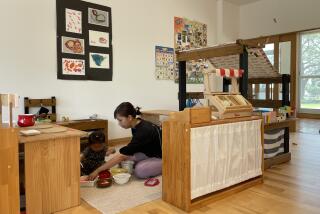Alcoholism Rises in Reserved Japan
- Share via
TOKYO — The end of the year, when most adult Japanese let down their hair and partake in weeks of boozy revelry, is particularly rough on Kazuo Sato.
Sato, a 52-year-old executive at a Tokyo pharmaceutical company, is trying to remain sober. Three years ago, he said, that was impossible. “I was having a frustrating time at work, and I was drinking every night. It got to the point where my hands were shaking so badly I couldn’t sign papers.”
He now goes to counseling sessions every day--sometimes two or three times a day--and said he feels lucky to be alive.
Sato’s case represents an extreme but, according to some experts, a rising trend in Japan’s reserved society. The society has long treated alcohol use as one of the few acceptable means of letting off steam, despite an inherent physiological susceptibility to drunkenness.
Kenji Shigemori, a physician specializing in the treatment of alcoholism, said that half of all Japanese lack a key enzyme, ALDH, that helps the body process alcohol. The result, he said, is that the faces of Japanese drinkers tend to redden, their hearts beat faster and “it’s easier to get drunk. People have to be extra careful at year-end parties. If they don’t have this enzyme, they will pass out.”
This is particularly evident in December, when companies hold nightly “forget the year” parties. These are followed in January by a string of New Year’s parties, adding up to almost two months of steady drinking.
“We find that most heavy drinkers have to be hospitalized in April each year because, after drinking so much in December and January, they collapse a few months later,” Yukie Yamamoto, general manager of Alcoholics Anonymous in Tokyo, said.
Japan’s Health Ministry estimates the number of alcoholics in the country at about 2 million--about 1.6% of the population of 123 million.
Tomomi Imanari, director of the National Citizens’ Assn. on Alcohol Problems, said the actual number of Japanese with drinking problems is probably at least double the ministry’s figure. According to a 1987 government survey, 56.8% of men and 19.9% of women said they drank every day.
In 1952, nearly 216 million gallons of liquor were consumed in Japan. By 1990, the total reached about 2.4 billion gallons--a record 26.5 gallons for every adult nationwide.
Beer is by far the most popular alcoholic beverage in Japan. Last summer, a record 572 million gallons of beer were consumed--an average of 38 bottles for every adult between June and August.
Wine, either imported or domestic, is something of an oddity to most Japanese. Most wines remain confined to hotel menus.
Many Japanese believe they have no choice but to imbibe. Important business decisions are frequently made in bars, where the need for strict public formalities is eased.
Top executives who have generous expense accounts tend to congregate in posh, upscale nightspots where regular customers keep private bottles of imported liquor. A single night of carousing can run up a tab in the hundreds of dollars.
On the other hand, white-collar workers frequently turn to neighborhood watering holes where the proprietor gives them special treatment and, for the regulars, special prices. These modest, congenial establishments are like a second home to many middle-class Japanese.
Because work doesn’t necessarily stop when Japanese businessmen unwind over drinks, they have developed a custom of watering down liquor to make it last longer.
This enables partakers to keep clear heads until the matter at hand has been settled. However, they still have plenty left in the bottle for a round of singing along with the karaoke machine, a form of jukebox containing only instrumental versions of songs.
An unwritten code decrees that anything improper said under the influence of alcohol will be forgotten. Company workers often turn to after-hours partying with colleagues as a means of saying what’s really on their minds.
Imanari and others point accusing fingers at Japan’s powerful Finance Ministry, which collects about $15.4 billion annually in alcohol taxes. For this reason, the accusers say, the government remains virtually silent on the subject of raising the population’s awareness of alcohol-related problems.
“That’s not true,” said Masatoshi Morikawa of the Finance Ministry’s taxation division. “The ministry cares about how much people drink. But not all people who drink have a problem. Think of all the good effects of alcohol. A proverb says, ‘Liquor is the best of 100 medicines.’ ”
More to Read
Sign up for Essential California
The most important California stories and recommendations in your inbox every morning.
You may occasionally receive promotional content from the Los Angeles Times.














